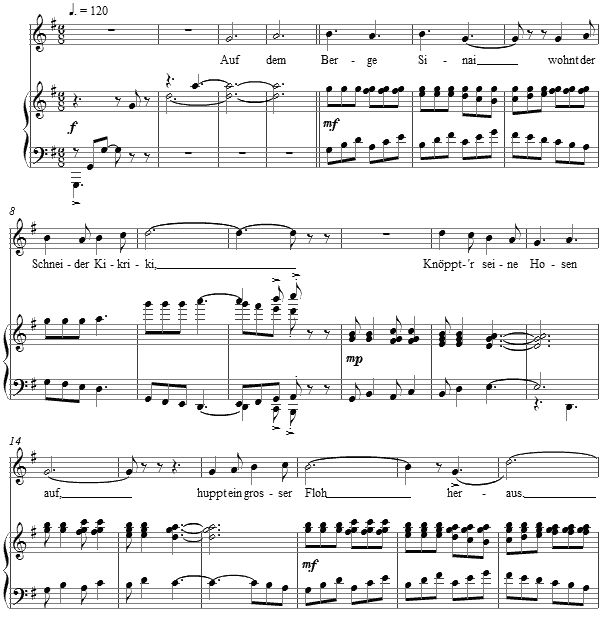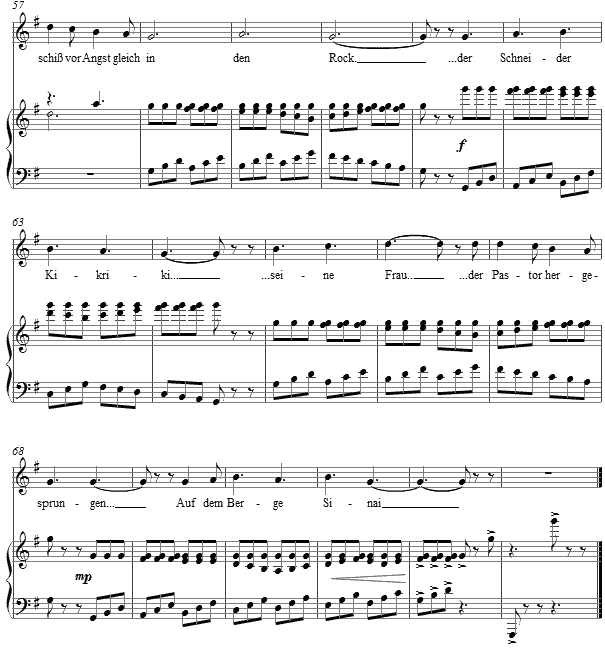Music and Texts of GARY BACHLUND
Vocal Music | Piano | Organ | Chamber Music | Orchestral | Articles and Commentary | Poems and Stories | Miscellany | FAQs
Auf den Berge Sinai - (2009)

from Kinderreime aus Leipzig (Müller)
for medium voice and piano
Auf den Berge Sinai
Wohnt der Schneider Kikriki,
Knöppt'r seine Hosen auf,
Huppt ein großer Floh heraus.
Seine Frau, die alte Lerche,
Ließ e Förzchen in der Kerche,
Auf der großen, langen Bank
War e großer Forzgestank.
Kam der Pastor hergesprungen:
"Frau, Sie hab'n falsch gesungen."
Und der Kutscher auf dem Bock
Schiß vor Angst gleich in den Rock.
[ 3 pages, circa 1' 15" ]
On top of Mount Sinai
Lived the tailor Cock-a-doodle-do, [ 1 ]
Who unbuttoned his pants,
And out hopped a huge flea.
His wife, the old Lark,
Passed wind in the church,
while sitting in a great, long pew,
where it made quite a stink.
For this the preacher sprang up:
"Madam, you have sung a false note."
And the coachman on his box
Crapped for fear right in his pants.
This text -- of course, utter nonsense -- is reprinted in Deutsche Unsinnpoesie (Philipp Reclam jun. Stuttgart, 1978) from the original which is noted as Kinderreime aus Leipzig (Müller). Children's rhymes from Leipzig, as a title, does not adequately describe such a bawdy nonsense poem by today's standards, but as with the humor of Mozart's own texts - Drei Kleinigkeiten - as but one example of many, such humor has its place. See also "Annonce" in my cycle of short songs settings, Goethe-lieder, for another example of such bawdy German humor across centuries set to music.
This text is a spoof on what some might deem to be a more child-appropriate text. [ 2 ] And yet that original speaks of the wife breaking her leg and a doctor stitching it up again in a time when anesthesia was relatively less available, especially to the poor; so one makes one's choice as to whether to tell the tale of bathroom humor or real-life pain. The purpose of such parodies was to break taboos, and certainly the taboo of speaking vulgarly about passing wind and defecation is something which most children pass through at some point in their growing to adulthood. We adults, once children, remain amused while often following the civil rules against such common speech -- in general -- but not at all times. For this I mention Goethe and Mozart as above as examples of creative adults who still played with such taboo breaking.
The coda to this short setting recalls the major characters of this wee farce, with the exception of the coachman who is likely to be remembered anyway.
The score for Auf den Berge Sinai is available as a free PDF download, though any major commercial performance or recording of the work is prohibited without prior arrangement with the composer. Click on the graphic below for this piano-vocal score.
NOTES
[ 1 ] The rooster's cry, "kikriki," is found in one example in Das Märchen von dem Witzenspitzel, of Clemens Brentano, "...wie ein Hahn kikriki, kikriki zu schreien." For this one might translate it correctly as "cock-a-doodle-do." Another example may be found in chapter ten of Friedrich Spielhagen's Problematische Naturen, ""Was halten Sie von diesem Gedichte?" fragte die Dichterin. "An meinen Haushahn." Oswald lehnte sich wieder in seine Ecke. "Gleich Richard von der Normandie fürcht't sich mein Held im Leben nie, wem bangte nicht, sobald er schrie: Kikriki!"
[ 2 ] The original children's nonsense poem is as follows:
Auf dem Berge Sinai / wohnt der Schneider Kikriki, / seine Frau, Margarete, / saß auf dem Balkon und nähte, / fiel herab, fiel herab, / und das linke Bein brach ab. / Kam der Doktor hergerannt / mit der Nadel in der Hand, / nähte es an, näht es an, / daß sie wieder laufen kann.
(Translation: On top of Mount Sinai there lived the tailor, Kikriki. His wife, Margaret, sat in the balcony and sewed. She fell and fell some more, and broke her left leg. The doctor came rushing over with a needle in his hand, and sewed and sewed her so that she could walk again.)
A folk rhyme, it is found in Kinderreime aus Leipzig und Umgebung, collected by K. Müller, Leipzig 1890.


